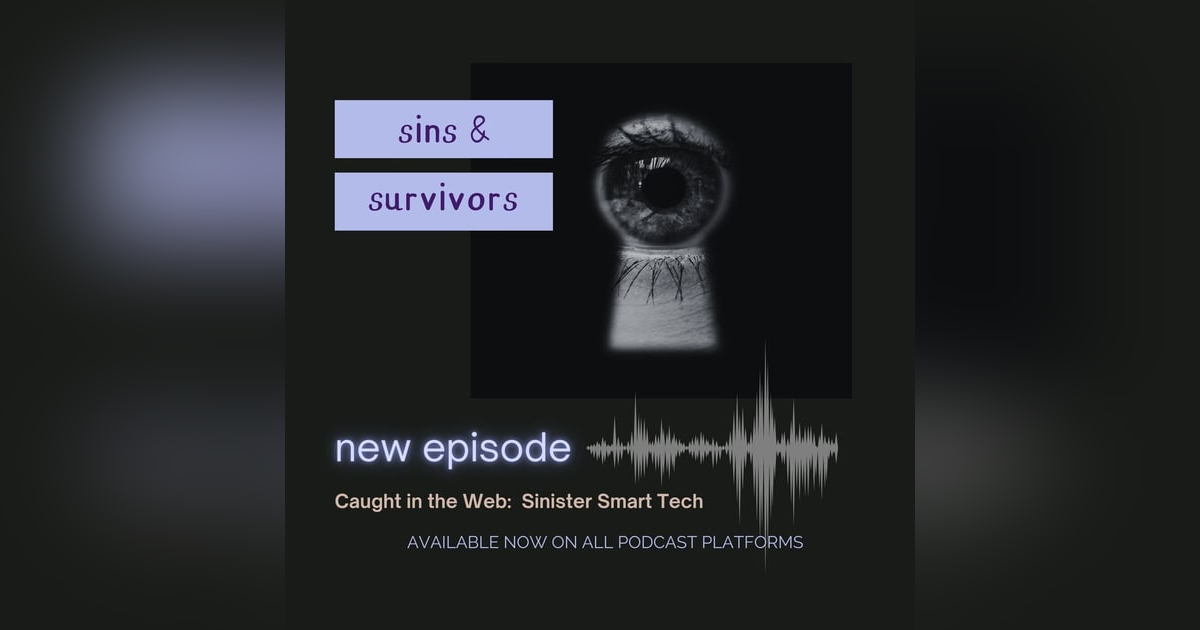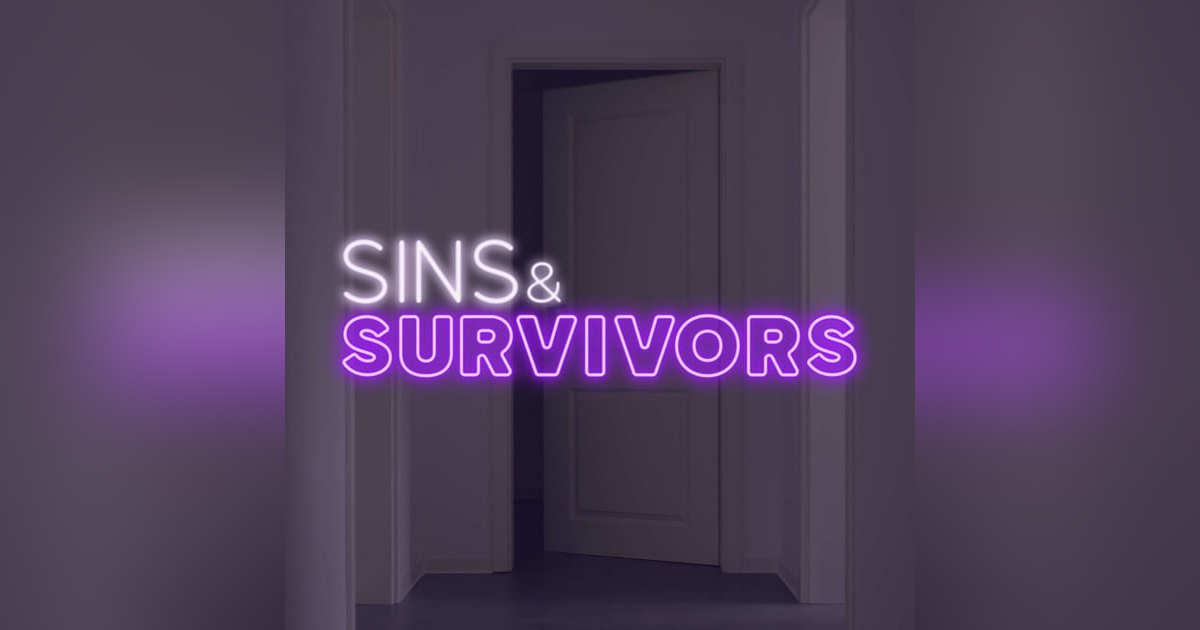Caught in the Web - Sinister Smart Tech

In this week’s episode of Sins & Survivors, we talk about the issue of tech abuse in cases of domestic violence. We’ll highlight examples of hidden cameras being used for spying and harassment, as well as other smart devices that can be manipulated for control and intimidation.
We’ll also suggest tips for protecting yourself from tech abuse, such as being cautious of shared contact information and disabling certain features on devices.
https://sinspod.co/episode7sources
Domestic Violence Resources
http://sinspod.co/resources
Click here to become a member of our Patreon!
https://sinspod.co/patreon
Visit and join our Patreon now and access our ad-free episodes and exclusive bonus content & schwag!
Apple Podcast Subscriptions
https://sinspod.co/apple
We're now offering premium membership benefits on Apple Podcast Subscriptions! On your mobile device
Let us know what you think about the episode
https://www.buzzsprout.com/twilio/text_messages/2248640/open_sms
Disclaimer: This post contains affiliate links. If you make a purchase, I may receive a commission at no extra cost to you.
Have you ever wondered as you're hanging out in your Airbnb or in a hotel room in a major chain if someone might be watching? What about in your living room, your bedroom, or your bathroom? Could someone have planted a camera in there somewhere, in a smoke detector, an alarm clock, or even something as small as a screw or a power outlet?
We'll talk today about some examples of the tech abuse side of domestic violence, some cases and some tips for protecting yourself from being spied on, manipulated and abused
Hi, and welcome to "Sins and Survivors, a Las Vegas True Crime Podcast," where we focus on cases that deal with domestic violence. I'm your host, John, and with me as always is the one and only Shaun.
I am the only Shaun in the room.
You are. Before we get started, I wanted to share an update about the Tabitha Tozi case we covered in our November 14th episode. If you haven't listened to that one, we'll put a link in the show notes, or you can just go to www .sinsandsurvivors .com and listen after you're done with this episode.
The leading suspect in Tabitha's murder is Nate Sanchez, whose full name is Oswaldo Nathaniel Perez Sanchez. The FBI has increased the amount of the reward being offered for information leading to his arrest from $10,000 to $30,000. We'll repost his photo and his wanted poster, so please share it because all it takes is one person to recognize him and to bring him in for her murder. Anyone with information should call Las Vegas Metro Police Homicide at 702-828-3521 or contact Crime Stoppers of Nevada 702-385-5555. You can remain anonymous when you contact Crime Stoppers. We should also mention that Perez Sanchez is considered armed and dangerous and you should not approach him or confront him yourself.
So today is another Tech Corner episode and today's episode and mostly all of the episodes, really, that are Tech Corner, we'll be talking about some aspect of tech abuse as it relates to domestic violence and issues like stalking, invasion of privacy, and intimidation.
Before we dive in, though, I wanted to talk about a new feature in the latest iPhone software that if people aren't aware of, they need to be. It's called NameDrop and it allows you to bring two phones close to each other and then initiate-- contact sharing.
It's important to know that you have to accept the contact information coming in from the other person, and importantly, you have to choose to share your info with that person. So according to Apple, and I included the link to the support article, someone can't just steal your information, but we still recommend turning this off until the feature is better fleshed out by going to Settings→ General → AirDrop, and then “bringing devices together” and just toggling that option off.
That's good to know, but it's also important to remember that if your phone is unlocked, someone can just click that Share button, which is why it's a good idea to just disable it completely and make sure that you don't leave your phone unlocked.
Okay, let's get into the episode.
On the last tech corner, we talked about the Apple Air tag, which can only be used for location tracking, but location tracking is really only the very beginning when it comes to using tech for stalking and harassment. When smart home technology is controlled by just one person, it takes away control from the other people in the home. Surveillance turns into stalking, and stalking can easily lead to violence. Today we'll talk about a whole set of other devices that can be used for harassment, monitoring, control, intimidation, and even revenge.
Many smart homes have smart devices in them these days. We, for example, have, I don't even know, six or seven Alexa dots or tap smart speakers throughout the house, and we have smart lights, thermostats, garage doors, TVs, door locks, and even cars. It's actually a pretty scary list when I read it off like that. Not to mention the security system devices that include doorbell cameras, motion detector lights outside, and entry sensors on doors. Collectively we call these things the Internet of Things, or the IOT, and any of them can be a target for hacking or abuse by a malicious person.
It's been estimated that there will be 125 billion of these IOT devices in use by 2030.
And 25 % of those will be in our house.
At least.
As usual with technology, these devices can be incredibly useful and convenient for things such as opening a door remotely for a family member coming to feed your cat or checking on your dogs when you're away or being notified if your side gate is opened or when a package arrives.
You can use it for screening people at your front door to see when Amazon drops off your stuff. Being able to close the garage door when you're on vacation, we've used that one a lot, seeing if your house sitter shows up. And also we use our side camera. We have a camera on the side of the house and we always know when our neighbor is putting her garbage out. So really important stuff.
But because people are people, abusers have come up with creative ways to abuse these technologies, of course. And oddly, when you look into this, there seem to be a lot of cases in the UK and Australia having to do with tech abuse.
The earliest one we could find where someone was prosecuted was in 2018. And this happened in Manchester, England. This case resulted in an 11-month prison sentence for a Manchester electronics expert named Ross Carons.
Ross and his wife had a tablet mounted on the wall of their home that they used to control the heating and lights in their house. Ross, was convicted of using that tablet's microphone to listen in on his wife after they split up and when he heard her say that she no longer loved him, he confronted her at the house and quoted her words back at her.
So their incident escalated and he pushed his wife in front of their two children, spat on her car's windshield and verbally abused her.
We are surrounded by tech and I think it's easy to forget as it blends into your life. that these devices might have things like cameras and microphones that could see you or eavesdrop on you.
So let's start with scary statistics. In 2019, a report by the National Network to End Domestic Violence (NNEDV) found that 71 % of domestic abusers monitor survivors' device activities and 54 % downloaded stalkerware onto their partner's devices.
The Journal of Family Violence released a study in January 2020 revealing that 60 to 70 % of surveyed women have encountered stalking and 60 to 63 % have suffered from technological abuse by a close partner.
Yeah, that is some scary information. And when we talk about technology-based abuse, you probably think of cameras first, you know, such as your doorbell camera or outside security cameras that monitor who's coming and going from your partner's place or even scarier are the hidden cameras.
It might surprise our listeners to know exactly how small cameras have gotten. They can be and often are hidden in things that are as small as a head of a screw or the ground plug of an electrical outlet.
You and I found one that was for sale on Amazon, which was a screw-head camera, and in the listing, it said that the recommended uses for the product were spying and it even has a Cyber Monday discount. Probably because these things are so available, according to surveys conducted by IPX1031 in 2019 and 2023, between 5 % and 10 % of Airbnb renters found a hidden camera at their rental. And that doesn't include the cameras that are in the public areas. This really only talks about cameras that are not disclosed in the listing.
So beyond the use of cameras, which is incredibly scary, there's a whole other internet. of Things, IOT, that can be used to harass, monitor, control, intimidate, and exact revenge on people. It's a whole other scary level.
We've seen cases documented of people using quite a set of these things, including thermostats, door locks, lights, speakers, smart home devices, and even cars. And now that many of our cars are connected, people can easily do things like unlock a partner's car remotely to search or hide in them,
or even remove their own access to their car. I know that's possible with at least one of our cars, and that could really be used to mess with someone.
When I was thinking about this, I imagine a scenario where some pissed-off ex who set up the thermostats in your house might turn the temperature way down in the winter, in the middle of the night, or turn up the heat in the summer, or maybe remotely open your garage door, or even your door locks, which is a real, real safety concern. And of course, you can always use the drop -in feature using an Alexa device as kind of an intercom within the house, and that could be used to eavesdrop or intimidate someone.
So that's why it's crucially important that if your home has these smart devices, you're aware of how to operate them and if you have a partner who set them up and is no longer in the picture, you need to take steps to ensure they no longer have access. Know where all the smart devices are in your house and how to access them, remembering how many types of each kind there are of these devices, whether they're ring cameras or blink cameras, or simply safe cameras, there can be a lot of them. And there's no lack of examples of people using technology for gross and immoral purposes, but we picked a few to talk about.
The first one happened right here in Las Vegas, around CES in 2016, and it has to do with hidden cameras. The case involves a group of tourists who were here for CES. CES is the Consumer Electronics Show, and we have it every year in January. It's a huge convention that's open to everyone and attracts electronics experts from all over the world.
So a group of coworkers who are coming to CES all decided to share an Airbnb, and they found one that was being rented out by a man named Christopher Gregory Rogers. So the group booked this Airbnb, and they were told about cameras in the common areas of the house, but Rogers told them there were no cameras in the private areas like the bathrooms or bedrooms, which is also prohibited generally by Airbnb policy. So one of the coworkers noticed an out-of-place smoke detector, like in one of the bathrooms there were two smoke detectors, and I'm guessing since they were in town for CES, the Consumer Electronic Show, they had some experience in home electronics, and they became suspicious and started looking around the home.
There's probably no worse demographic of people to attempt to leverage technology against, so that's pretty poetic. They ended up finding six other cameras in a bathroom and in the bedrooms, and another camera hidden in an iHome clock radio that recorded onto a flash drive.
So at that point, they decided to call the Las Vegas Metro police to the house. The Metro officers collected the cameras that the group found, and they reviewed the footage, and they found footage of people in various states of undress that had been recorded between December 2015 and January 2016, and they also found footage of Rogers adjusting the cameras, which was their smoking gun. They were obviously his cameras, and they weren't placed there by some previous renter or maintenance person.
Rogers was then indicted on eight counts of what's called capturing an image of the private area of another person, which is classified as a gross misdemeanor in the same category of, you know, same category as indecent exposure. And the judge ruled that all of the plaintiffs,
the victims, they signed up for Airbnb accounts and agreed to the terms of service, which required them to go through arbitration in order to settle these claims.
It's important to note also that any properties listed by Rogers, which had names such as Oasis Masterpiece in Paradise and Casa de Rogers, they are no longer on Airbnb and he is unsurprisingly and thankfully out of the short-term rental business.
Another case that happened in the Las Vegas area comes from Overton, Nevada. Overton is about an hour northeast of Vegas, not too far from Moapa where we like to go every fall for the Haunted Corn Maze. Overton is a very small town, the population is only about 2,200 people.
This just happened last year. A man named Wayne Wells was accused of hiding a camera in a bathroom and secretly recording a woman who knew him. This happened over the course of several years starting in 2016.
So she discovered the camera hidden inside an alarm clock. It was motion-activated and the police found 44 videos in the camera's memory and more than 7,000 photos. Wells was arrested and charged with "capturing an image of the private area of another person which is a gross misdemeanor, gross in more ways than one I guess."
That's a really well-named category of crime, gross, really gross. And also they didn't specify but was this guy her handyman? How did he get access to her place? It's all very sketchy. There were no details that we found about that part of it. He ended up pleading guilty to the charge and was sentenced to serve 90 days and be under intensive probation for the following year. He was also ordered to undergo a mental health evaluation.
In March of 2023, just a few months into his probation, his attorney made a motion to discharge his probation. Wells had been moved into an assisted living facility because he was suffering from dementia so the judge ruled to release him from that intensive supervision.
Coming up, we'll talk a little bit about what to do if you find a hidden camera in your house, but before that, in the spirit of it can happen to anyone, we have a couple of examples of this type of harassment happening to well-known people.
These seem to ratchet up the stakes too, which is kind of interesting. The more high profile these people are, the more horrifying their stories are, it seems. Just a few weeks ago, in late November 2023, former tennis star David Nalbandian was accused by his ex -girlfriend, who is an Argentinian model and influencer named Araceli Turado, of putting a hidden camera in the air vent of her apartment to spy on her.
Tennis fans may be familiar with Nalbandian. He was an elite tennis player in the early 2000s. He won 11 singles tournaments, including the 2005 Masters Cup in Shanghai, and he was a Wimbledon finalist, and at one point he was ranked as high as number four.
Araceli and David shared an apartment in Palermo, Italy at one point.I think they dated for about six months, and when they broke up, he moved out. But Araceli's brother saw light coming through an air vent in her bedroom, and he took the cover off, and he discovered that there was a camera behind the vent. And there is actually video of him online, you can find it on X, of him finding the camera, and we will be sure to share that on our social media, and you can find the link in our show notes.
It's a definite must-watch. That video is crazy to watch, just to see how it was set up inside of the vent like that. The way that her brother found the camera was to look for a glow, and that's a really great way to do it. There's often a red light on the camera that shows up in a dark room.
When Araceli found out, she pressed criminal charges, of course, but the Italian judge dismissed the charges, saying that since it was David's apartment at some point too, there was no no crime. She was able to get a recorded confession from David stating that he hid the camera, but he couldn't see anything because of internet issues, which is a pretty, pretty lame, half -assed apology.
Yeah, according to reporting, she said, "It seems pathetic to me that you are not able to admit this to me. I found the camera." And David replied, "What I'm worried about is being on good terms with you, and I want to find a way to do it." And then he also said, "Do you want me to be honest? Yes, I put it on that day. I couldn't see it because I don't know what the internet is like. You can't see it, so I didn't see anything at all."
Where it stands now, she's currently suing him in civil court for stalking and sexual harassment. Arcelli has thanked her fans for their support, and we will bring you an update when we have one. And this final case John, is a case you just told me about the other day. You told me about what had happened to Erin Andrews.
Erin Andrews was a sportscaster for ESPN and Fox Sports, and at one point she was the host of Dancing with the Stars. What she went through is particularly disturbing and horrific.
She was really well known. She was absolutely huge in the sports casting world, and I'm not sure how this existed, but in 2007 she was voted Sexiest Sportscaster by Playboy Magazine, which 15 years later seems incredibly sexist and horrifying. But that's a thing. I don't know if it's still a thing, but it was a thing in 2007. I don't know who the Sexiest Sportscaster of 2023 is. I don't know who it is.
Okay, so in 2008, Erin was staying in a hotel room, and a man named Michael Barrett reversed the peephole in her hotel room. So of course, the peephole allows you to see a very wide angle outside of your home, so when someone knocks on your door, you can see who's at your door. So you can imagine that if you reverse the peephole, it does the same thing, looking into the house. And of course, they're only one way. So he connected a camera to the reversed peephole and took a very long video, several videos in fact, and posted one of them onto the internet where it went viral. He recorded a lot of footage of her and the video was seen by millions of people. And I guess, you know, suffice it to say that she was naked in the video and it was sort of a private thing.
Yeah, it's sickening to even think about. Erin reported she suffered from depression and public shame and humiliation after what happened.
Barrett was happily arrested in October 2009 at O'Hare International Airport and he promptly pleaded guilty to the criminal case. He served two and a half years in federal prison and Erin also sued him as a part of her civil case along with the hotel for what had happened. And she was awarded $55 million, which is kind of awesome.
What was particularly sickening about this whole ordeal? Again, remember this was 2008. Was that during the trial, she testified that her employer at the time ESPN would not allow her to return to broadcasting, covering college football until she had spoken publicly about the incident on television, which she didn't want to do. That was not something she was interested in doing.
They demanded this of her because there were rumors that this was a publicity stunt. She did end up eventually speaking to Oprah about what happened. She felt comfortable with Oprah knowing that Oprah herself had at one point been a victim of a crime but it's just so upsetting and twisted that they put her through that ESPN statement was that they were “supportive” of Erin during this whole ordeal.
It makes me wonder what they would have been doing if they had been unsupportive because that does not seem very supportive to me.
Or me.
I'm glad we agree.
So, all these are pretty gross and really terrifying, but none of us want to stop going to Airbnb's. You and I stayed at one up in Big Bear Lake this summer, which was totally awesome. And at the time, we weren't really thinking about this at all. But I will tell you that next time we stare and stay at an Airbnb, we will definitely be thinking about it.
For sure. So that's my question to you. What can people do to stay safe? My first thought is like you said, we have to be aware and you have to have your guard up. Unfortunately, that seems to be the reality. So what are some things that people can look for specifically?
It's really all about sort of being aware and constant vigilance. So you want to look for suspicious objects, really anything out of place, because cameras can be concealed in anything, they can be concealed in plants, or a pair of glasses, or a Kleenex box, or, you know, it could be a fake computer or a pen, it can be an extra smoke detector in the room. That was pretty obvious. If you see two smoke detectors in a room, you know, something's, you know, wrong. Out of place stuffed toys. That's an obvious one. Alarm clocks in the bathroom. Really look for anything that seems to be out of place. You can also make the room as dark as possible,
and like Araceli's brother did, look for lights coming through air vents. The other thing you can do is you can use your cell phone to detect hidden cameras. A cell phone camera can see the infrared light that gets admitted by a hidden camera, which of course our eyes cannot. You can actually test that with a TV remote with an IR emitter first. So you just take the IR emitter and you point it at your camera, and see if you can see the flickering of the IR light in the camera.
camera.
We'll share a YouTube video that shows someone doing that. And it's more likely that the front-facing camera is going to be the camera you'll find on your phone that works better because newer cameras have IR filters on them, but definitely test it. And you'll know it's working because on the camera screen you'll see a flickering light, which is the IR in the camera. And if you see that, you should definitely look closer. And if you do locate a hidden camera, for sure, your first instinct is going to be to like Hulk smash, just like break it into pieces, but you really shouldn't do that for a couple of reasons. First, whoever is spying on you. So if you're in the Airbnb, your host could come after you for destroying that property and that could potentially complicate any court case or you don't want them having anything to say about how you treated their property or getting a big fine from Airbnb or whatever.
But secondly, if you destroy it, you'll also destroy the evidence potentially. The camera might have fingerprints on it or an SD card that contains images that could be the evidence you need.
And even touching it could blur the fingerprints. So just let it be instead, take photos of it, take videos of it and cover it up or move it to another room in the house out of its view, or you now are aware of that it can see you, you stay out of its view and contact the company. So let's say Airbnb or the hotel management, or you can contact law enforcement too if you feel safe doing that. But for obvious reasons, do not contact the host of your Airbnb because they are very likely to be the one who put it there. And with the example of the tablet with the couple in Manchester, the tablet that controlled the lights in their house. So as John said earlier, it's important to be aware of who has access to the devices in your home, change your passwords and delete access when you need them. need to do that.
So yeah, that'll wrap it up for this week. Please email any tech-related questions to me at tech@sinsinsurvivors .com and we'll answer your questions in upcoming episodes. You can find all the resources in our show notes or on sinsinsurvivors.com.
Be sure to like, subscribe, and follow us on social media and share these tips with friends because what happens here happens everywhere.







